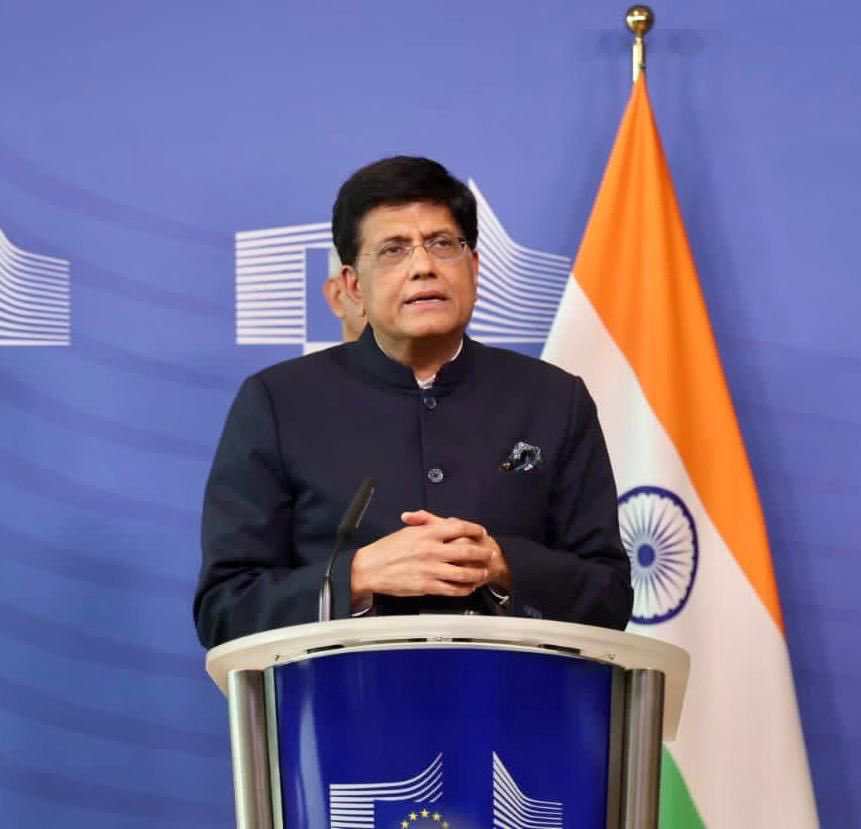
India’s trade deal with Switzerland to be operational by 2025-end
NEW DELHI : The Trade and Economic Partnership Agreement (TEPA) between India and the European Free Trade Association (EFTA) will be fully operational later this year, Commerce Minister Shri Piyush Goyal said. The EFTA includes four nations: Iceland, Liechtenstein, Norway, and Switzerand. The announcement comes nearly a year after the trade agreement was signed officially on March 10, 2024.
A India-EFTA dedicated desk was also inaugurated, which will serve as a dedicated platform to promote trade, investment, and business facilitation between them as part of the commitment in the trade deal to push private companies to invest $100 billion in the South Asian nation in the next 15 years.
“We hope to operationalise the TEPA in the later part of the year….all the four nations are going through their internal ratification processes, in India we have already approved the TEPA, so we are sorted…we have to wait for their parliamentary processes, which may take anywhere between four to six months, for all four countries to conclude, so fall of 2025 is somewhat possibly feasible, I would think,” Goyal said at a media interaction after the launch of the India-EFTA Desk.
While, the trade and investment deal between India and EFTA nations was inked on March 10, 2024, it is yet to be implemented given lengthy ratification processes. For instance, for a trade agreement to kick in, Switzerland typically takes the referendum route before green lighting any agreement from their end. A referendum is a vote in which the people of a nation are asked to either accept or reject a particular proposal.
Apart from that, Liechtenstein and Norway’s Parliaments too have to ratify the trade deal before it can be operationalised, a process which is currently underway.
Helene Budliger Artieda, Swiss State Secretary explained that Switzerland has a two-chamber system, “TEPA has passed through the first chamber, with no votes against it, it is now heading towards the second chamber…after which it has to go through a referendum.”
Negotiations on a broad-based trade and investment agreement between the EFTA states and India were launched in January 2008, but after 13 rounds of negotiations, talks were paused in 2013.
Talks resumed in October 2016. And, after around 21 rounds of negotiations, the trade pact between the two sides was inked last year. The agreement has 14 chapters, which include areas such as goods, services, rules of origin, intellectual property rights (IPRs), and investment promotion.
Total trade between India and EFTA nations stood at around $18.66 billion in 2022-23, with the largest share belonging to Switzerland, followed by Norway.
India-EFTA Desk
The India-EFTA desk, which will be set up within Invest India, an arm of the commerce ministry will help fast-track investment flows from private businesses in EFTA nations, in line with the commitment made in the trade deal.
The India-EFTA Dedicated Desk will act as a centralised support mechanism for EFTA companies looking to expand in India. It will provide market insights and regulatory guidance, business matchmaking, and assistance in navigating India’s policy and investment landscape.
“The India-EFTA desk will cut across all line ministries and have dedicated officers to ensure flow of investment as promised in the trade deal. Plan to include officials from the Director General of Foreign Trade and some state officials in the workings of the dedicated desk,” Goyal elaborated.
This initiative is in line with Chapter seven of the India-EFTA Trade and Economic Partnership Agreement.
As part of the trade and investment deal, EFTA countries will aim to increase foreign direct investment from investors of these nations into India by $50 billion within 10 years from the time the agreement comes into force, and an additional $50 billion in the next five years.
The bloc will also look to facilitate generation of one million jobs within 15 years in India from the time the agreement is operationalise as a consequence of the commitment on foreign direct investment inflows.
However, the investment promised by EFTA nations will hinge on India maintaining a nominal GDP growth rate of around 9.5 percent in US dollar terms in the next 15 years, which is in line with the South Asian nation’s past growth rates, as well as on the anticipated benefits of a full implementation of the agreement.
After the inauguration of the dedicated desk, a high-level EFTA-India Business Roundtable will be convened, featuring over 100 leading businesses from the two sides to fostering collaboration across key sectors, including Pharmaceuticals & Life Sciences, Financial Services & Fintech, Mechanical & Electrical Engineering, Energy & Sustainability, Seafood & Maritime, Food Processing & Agritech.
“The roundtable will provide a structured forum for companies to explore joint ventures, investment opportunities, and technology partnerships under the framework of TEPA,” India’s commerce ministry said in a statement.
Budliger during the interaction said, ” Swiss pharma, Watches, SME companies around tech, transport and banking, insurance are some of the sectors and companies that are interested in investing in India.”

